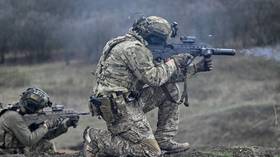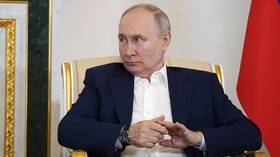West knew Ukraine wasn't ready for counteroffensive – WSJ

Western military officials knew earlier this year that Ukraine lacked the supplies and training necessary to launch a successful counteroffensive against Russian forces, but allowed Kiev to launch its disastrous operation regardless, the Wall Street Journal reported on Saturday.
Nearly two months since it began, Ukraine’s counteroffensive remains stalled. By attempting to advance through Russian minefields without air support or adequate anti-air weapons, the Ukrainian military has lost 26,000 men and more than 3,000 pieces of hardware, according to the latest figures from Moscow. In return, Ukraine has captured only a handful of hamlets and villages, while failing to penetrate Russia’s multi-layered network of defensive trenches and emplacements.
The US and its allies knew that such an outcome was inevitable, according to the Wall Street Journal. Citing leaked Pentagon documents, the newspaper claimed that US military analysts counted a “tiny number” of Ukrainian weapons capable of hitting Russian aircraft, and determined that Kiev would face an “inability to prevent Russian air superiority.”
“America would never attempt to defeat a prepared defense without air superiority, but [the Ukrainians] don’t have air superiority,” John Nagl, a retired US Army lieutenant colonel, told the paper. “It’s impossible to overstate how important air superiority is for fighting a ground fight at a reasonable cost in casualties.”
In public, American officials told a different story. “We believe that the Ukrainians will meet with success in this counteroffensive,” White House national security advisor Jake Sullivan told CNN on the eve of the operation. Several months earlier, Dan Rice, an Iraq War veteran who now serves as an adviser to the Ukrainian armed forces, declared that the counteroffensive would “shock the world” with its success.
European leaders were similarly optimistic. Polish President Andrzej Duda, who has been one of Kiev’s most fervent backers, announced in early June that the operation would lead to “the ousting of Russian military forces from all occupied territories.”
Western officials have since downgraded their expectations, and are privately “alarmed” at the lack of results on the battlefield, according to recent media reports. Western governments are therefore at a crossroads, and will soon need to decide whether to commit the massive amounts of arms, equipment, and money necessary to support Kiev in a longer conflict, the Wall Street Journal explained, citing anonymous diplomats.
Russian President Vladimir Putin has described Ukraine’s counteroffensive as “suicidal.” In a public address on Friday, he pointed out that despite the “colossal amounts of resources,” and “thousands of foreign mercenaries and advisers” that Kiev has received from the West, its counteroffensive has still resulted in failure.













